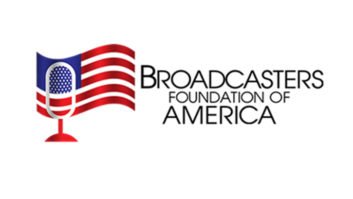The National Religious Broadcasters annual convention opens this weekend. Nine state Republican primaries or caucuses have taken place, but the March 6 Super Tuesday remains in the future.
When Radio World recently asked Senior Vice President and General Counsel Craig Parshall about the NRB’s concerns and priorities going into the show, the question of who would carry the Republican party banner into electoral battle with President Barack Obama remained quite an open one, and seemed unlikely to be settled quickly.

“It’s very hard to try to figure out, either by party or by candidate, how this election is going to turn out for us,” said Parshall. “Our issues, free speech and telecommunication issues, tend to not get a lot of the ink, and the headlines in the broad policy statements in the debates.
“The Internet issues seem to be creating strange bedfellows,” he said. “It’s not a conservative vs. liberal, or R vs. D battle in a lot of these cases. The supported opposition seems to be coming from a kind of unpredictable conglomeration of folks on the Hill.”
An exception is on the issue of network neutrality, in which “Democrats seems to favor net neutrality and the Republicans have some concerns about it. But even there there’s not an absolute rule,” he said.
One concern the NRB shares with the wider television broadcast community is that the U.S. government’s push for “voluntary” spectrum incentive auctions, designed to free up broadcast band spectrum for wireless broadband use, will morph into “involuntary” seizure of that spectrum.
“As we look at some of the spectrum bills that are floating around the Hill right now, we’re concerned that our television broadcasters don’t get disadvantaged unfairly,” said Parshall. His concerns include not only full-power television stations but also low-power licensees, which may be “shuttled to the back of the bus, so to speak — and, really, kicked off the bus.”
He challenged the need to reallocate any broadcast spectrum, pointing to “research about some of these [broadband wireless] companies hoarding spectrum that could be applied to the use that they [the FCC] want, therefore alleviating the necessity of an auction altogether.”
The Internet was not envisioned when the NRB formed in 1944, when electronic media of the day were radio and soon television.
“Now there are iPods and Web streaming, and cable and satellite, and iPhones, and cell phones with the ability to capture video and transmit it, texting and so forth,” said Parshall. “And our mission has always been to keep the ports of communication open for the gospel of Christ in every possible technology platform.”
The Internet is very much on the organization’s mind.
Against neutrality
On the FCC’s notice of proposed rulemaking on network neutrality, the NRB has testified in opposition. While many arguments for and against the concept and details of net neutrality come down to various players being economically advantaged or disadvantaged, Parshall said NRB worries about its effect on free speech.
“While the concept floated by the FCC purports to create a so-called open Internet, giving free and open access to citizens to the information [available on] the Web, in fact what it really does is create a complex mechanism of control that, in my humble opinion, doesn’t do anything to protect the freedom of expression rights of actual users of the Internet.”
In fact, Parshall said of the rules proposed by the FCC, “Basically it’s a defense for any Internet service provider to simply say or show, ‘Well, we’re using reasonable network management techniques as a way to run our Web, and our Internet platform.’ And I can cook up several defenses that an Internet service provider could mount as an excuse for censorship, but could make look pretty convincing as a network management business decision. So there’s really no free speech protection at all, and in fact, it may end up that this complex regulation will actually increase the amount of censorship rather than decrease it. So we’re very much opposed to that.”
He describes as “wrongheaded” the attempt to create a mechanism to supervise the Internet service providers.

Craig Parshall, right, talks with Speaker of the House John Boehner at last year’s NRB convention. ©NRB
“The philosophy should be, ‘What can we do to protect the rights of access of each individual citizen?’ And then go from there to say, ‘What measures can be used to achieve that end, as well as not stifling innovation, not impeding the commercial aspect of the Internet for these new media companies, and so forth?’”
Milton
Dovetailing his concerns about net neutrality, Parshall pointed to NRB’s John Milton Project for Religious Free Speech, which catalogs what the organization sees as viewpoint censorship on new media platforms.
In its first findings, issued in September, NRB “revealed our 43-page report analyzing the risks of censorship for the average user, given the current paradigm of the Internet, who’s controlling it, which companies have dominance and the innovation and the technology of new media companies right now.
“Out of all of these companies we looked at, only one of them really showed any strong interest in a principal of free speech,” he said. “Companies like Apple, Google and Facebook are on our index of problematic practices and policies, and they rank on the high end of our concern. Twitter is the only entity that really got passing grades from us, in terms of not having any policies or practices that showed that they either have censored content in the past or plan to do so in the future, which we found surprising.” (His November commentary in Radio World, “New Media Have a Free Speech Problem.”)
Parshall said that the Milton Project report has springboarded the NRB into suggesting that there are fundamental legal issues to be discerned about the Internet.
“We proposed an approach in that report where we first suggested that there are First Amendment rights at issue: the Internet is a public space, like a park, but the government doesn’t control it the way a city might control a public park. But it certainly is not a private space, because if it were, one company could conceivably possess or buy up the entire space, if it’s purely private property, which it isn’t.
“So it’s a hybrid, which means there aren’t any clear-cut, easy answers; but it seems to me that we start with saying, ‘How do we best protect the right of consumers to voice their opinions and gather information?’ Not just receive information but to transmit information and viewpoints, without being censored.”
He pointed to a short list of traditional First Amendment exceptions where new media companies have a right to screen out and block content. “For example, incitement to violence is a well-defined category that’s an exception to the First Amendment.” He cited pornography, obscenity or highly sexualized content, which “could be blocked by these new media companies without any hue and cry from us or any other civil liberties organizations.”
But, Parshall says, the list of such exceptions is short, “less than a hundred and less than 50, and they’re pretty well recognized by lawyers and judged. But absent being in any one of those categories, I think these companies ought to err on the side of freedom of content.”
The Milton Project is ongoing, he said. “We’re going to be looking at this again in 2012.”
Online public files
The FCC has filed a notice that will require television licensees to post their public files on the Internet. Parshall said that NRB is opposed to a particular provision, “the requirement that TV stations post, on the Internet, their political files and requests by issue advocacy groups to place advertisements on television.”
NRB’s argument is not that such information be excluded from a licensee’s public files altogether, but that those files not be made available by a few keystrokes on the Internet, “which we believe is rife with difficulty and could lead to retaliation.”
He offered this example: “Let’s say a pro-life organization might want to place an ad about pro-life issues. The current rule is that the names of the committees and their leadership of any group that requests that kind of ad has to be placed in the public file.” Under the FCC rule change, NRB said, those names could be “splattered all over the Internet,” even if their only contact with the TV station was to research ad rates and other information.
“We don’t know, as an example, why a person in Nome, Alaska, would have the same interest, would have an interest in finding out the names of people in leadership of a Toledo, Ohio pro-life group that wants to put an ad on a local Toledo television station, let’s say on an Ohio pro-life issue. We just don’t see that, the necessity of a person in Nome, Alaska having instant access to that type of information. It should be in the station file, so the people with legitimate interests can access it.”
As a real-life illustration, he pointed to retaliation against the California Proposition 8 Traditional Marriage Initiative campaign contributors, whose names were gleaned from the Internet and used “to create blacklist files of persons to be harassed.”
Istanbul
In January, several intellectual properties bills before Congress had been delayed. Speaking prior, Parshall said countries such as China have “an atrocious record of copyright thievery on the Internet, and that needs to be dealt with. But the current bills that are being floated around give us caution, because under the guise of enforcing copyright, you can end up closing down free speech.”
For example, “I think it was Google that complied with the request of a religious sect to block a critique of that sect by some commentator, because the commentator was quoting extensively from their own materials. In many situations that constitutes fair use, and there is a fair use defense that I think is a second cousin of free speech.”
Parshall said NRB worries that the proposed legislation will make it easy for entities to claim copyright violation and obtain a court order. This would allow Internet companies to block content quoting from copyrighted material by saying “‘I was just trying to comply with this court order.’”
“Our communicators, our radio talk show hosts, and our pastors and preachers and publishers and writers, and others that we represent in our organization, need to be able to point to original documents and original sources when making their case, whether it’s comparative religion issues, such as what does Islam say about Jesus, as opposed to what the Bible says about Jesus. What does this group, that may be a cult, say about our faith, and what does our faith say about that particular religious group that we think is a cult.
“These are discussions that are going to be hamstrung considerably if we don’t get this right on these copyright issues, because you can always say, ‘Don’t quote me because that’s a copyright violation.’ Well, suddenly now journalists can’t quote the sources that they want to counter.”
A United Nations initiative also has drawn concern from the NRB. It is called the Istanbul Process for Combating Intolerance and Discrimination based on Religion or Belief.
“Basically this Istanbul Process appears to be a substitute for a 12-year effort for an Islamic coalition to try to get the anti-blasphemy or defamation of religion resolution passed by the U.N.,” said Parshall.
Though the initial effort in the U.N. was unsuccessful, “this seems to be the new permutation of that, and it requires members like the U.S. to participate in this new program of tolerance with very little thought given to the free speech implications of requiring tolerance of religious views. It almost creates an atmosphere where any criticism of a religious world view hits the tripwire of international tolerance standards.”
NRB has not taken a formal position on the Istanbul Process; but. Parshall said, “Both sides of the political spectrum, both liberals and conservatives, and civil libertarians, looked at this and are saying, ‘Whoa, this seems to be a problem from a free speech standpoint.’”







